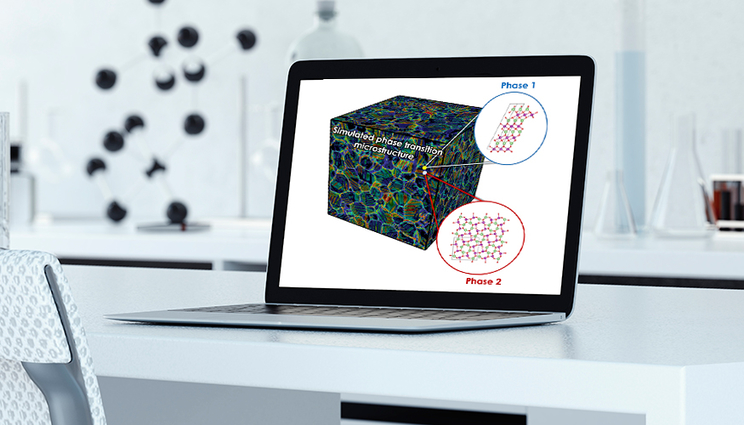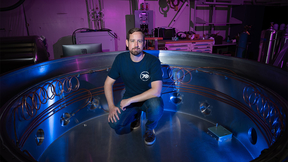New Lab projects to promote STEM diversity, accelerate battery research
 (Download Image)
(Download Image)
In a project recently awarded funding through the Department of Energy’s Funding for Accelerated, Inclusive Research (FAIR) initiative, Lawrence Livermore National Laboratory will partner with San Francisco State University to mentor postdocs and students to develop atomic to mesoscale models of phase transitions for energy materials. Pictured is a simulated phase transition microstructure using the mesoscale modeling approach, which is informed by atomistic simulations. Image courtesy of Tae Wook Heo.
Lawrence Livermore National Laboratory (LLNL) will partner with outside institutions to improve diversity in the STEM workforce and provide training to underrepresented students and researchers under a pair of projects recently funded by the Department of Energy.
With support from DOE’s Funding for Accelerated, Inclusive Research (FAIR) initiative, LLNL will partner with San Francisco State University (SFSU) to mentor postdocs and students to develop atomic to mesoscale models of phase transitions for energy materials. FAIR seeks to build research capacity, infrastructure, and expertise at institutions historically underrepresented in DOE’s Office of Science portfolio, according to DOE.
Over the three-year project, mesoscale simulations using phase field models from LLNL will be informed by atomic scale and quantum simulations from SFSU. The atomic scale simulations will be performed with machine learning force fields trained on density functional theory calculations. LLNL will provide expertise in atomistic modeling through mentorship as well as high-performance computing resources and conduct experimental synthesis and characterization to determine parameters that affect phase evolution in manganese dioxide (MnO2).
Researchers said the multiscale simulations will deepen insights into microstructural phase evolution of transition metal oxides through understanding the kinetics at the quantum, atomic, nano and micro-scales. The project will be co-led by principal investigator Sabrina Wan at LLNL and at SF State by associate professor Nicole Adelstein. The team also includes LLNL researchers Tae Wook Heo and Marissa Wood.
“We are excited to be awarded these funds to help us provide mentoring services to postdocs and students that will be hired from underrepresented institutions or communities,” Wan said. “We are looking forward to contributing our research expertise to this project and having these students onsite in the future through summer internships or collaborations to experience working in multidisciplinary environments.”
Building a better battery
In a separate project partnering with two minority serving institutions — California State University-Chico (CSU Chico) and San Jose State University (SJSU) — LLNL researchers will look to train a diverse STEM workforce to develop next generation materials for enhancing stability, catalytic activity and conductivity of lithium-sulfur (Li-S) batteries to meet national and international energy storage demands.
During the three-year Broadening Accessibility & Training To Emerging Researchers for Innovative Energy Storage (BATTERIES) project, LLNL will work with CSU Chico and SJSU to recruit, mentor and train 16 undergraduate and three graduate students of underrepresented minority, first-generation college students, and women subpopulations, along with two postdoctoral scholars.
The BATTERIES project’s overall goal is to improve fundamental understanding of the stability, catalytic activity and conductivity of metal organic frameworks (MOFs), a porous crystalline class of solids and tackle challenges related to the dissolution and diffusion of polysulfides that limit commercialization of Li-S batteries.
CSU Chico will provide synthesis expertise of electrically conductive MOFs and SJSU will perform electrochemical testing of the Li-S battery cell with the newly designed MOFs incorporated as the sulfur host. LLNL will predict new MOF chemistry from theory with enhanced electronic and catalytic properties.
“Through these partnerships, we are in an exemplary position to realize close-loop rational design of future advanced electrochemical systems. More importantly, the design of new conductive MOFs will be guided by theoretically predictions based on atomistic modeling, which is a key strength at LLNL,” said Wan, who will lead the project from the LLNL side. “With a special target to recruit students and postdocs from underrepresented institutions or communities, we can pass on our knowledge and research experiences to the younger generations, equip them with broader skillsets to meet unseen challenges from the future and benefit society as a whole.”
BATTERIES is led at CSU Chico by principal investigator Monica So and co-investigator Kathleen Meehan, at SJSU by co-investigator Philip Dirlam and at LLNL by co-investigator Wan. The project will receive $2,250,000 in total from DOE’s Reaching a New Energy Sciences Workforce (RENEW) initiative, which is providing at total of up to $70 million to support internships, training programs and mentor opportunities at 65 different institutions, including 40 higher-learning institutions that serve minority populations.
Contact
 Jeremy Thomas
Jeremy Thomas
[email protected]
(925) 422-5539
Related Links
Funding for Accelerated, Inclusive Research (FAIR) initiativeTags
Advanced Materials and ManufacturingEnergy
Physical and Life Sciences
Materials Science
Featured Articles







